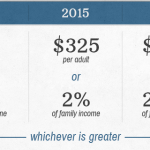
It’s Simple. See Your Doctor. Stay Healthy!
The key idea here is…wait for it…prevention. Employer sponsored plans or individual plans!
Every plan covers preventative care, which means you can go get your annual checkup for free (no copay or coinsurance!). Because of recent policy changes of the ACA, everyone’s health insurance now comes with free preventive care.
The “ins and outs”
Checkups go by different names: a physical exam, an annual, a checkup, a health maintenance visit, a preventive care visit, or just ‘catchin’ up with the doc.’ This is the providers responsibility to code the claim as a “CTP” code as preventative, not a diagnostic “CTP” code which will generally have out-of-pocket expenses.
What happens at a checkup? Typically, your doctor will:
- Take a History: You’ll get asked about medical problems, medicines, and social/lifestyle habits. Trek tip: this part usually takes the longest if you’re a new patient to the clinic.
- Do a physical: Height, Weight, Blood Pressures, Listening to the Heart and Lungs
- Order labs and imaging: (Chest X-Ray and preventative blood panel, based on lifestyle and family history)
- Assess your health:
- Make a plan:
Trek Tip: Checkups are also a great opportunity to work with your doctor on managing any diseases or medical conditions you may already have.
Trek fact: 1 in every 5 Americans get a physical in a given year. The medical community has research that catching early diagnosis of chronic diseases and “knowing your numbers” such as cholesterol, blood pressure, and blood sugar levels drive healthier population and healthcare costs.
What’s the point?
If you’re young, healthy, and don’t have any conditions, is a check-up worth it? We think so. Here are some benefits of meeting up with your doctor once a year:
- Screening tests: These are medical tests that help look for diseases before you have any symptoms. Doctors can screen for things like diabetes and different kinds of cancers. Just like you can’t feel high blood pressure, you can’t feel when you have high cholesterol (until its too late!). If you catch a problem before it gets serious, managing the disease can be much easier. If your doctor doesn’t find anything concerning, you leave with peace of mind.
- For youngsters: you might get a screening test for cholesterol if you have high blood pressure or heart disease in your family.
- For women: it might be time to get a pap-smear or mammogram -the most effective screening test ever developed for catching and treating cervical cancer and breast cancer.
- Vaccines: If you’re not up to date on all your vaccines, annual checkups are the time to get them. Did you know you have to get a Tetanus booster every 10 years? That’s right! I hate needles too!
- Prescription Refills: Take a regular prescription like birth control? A lot of doctors require an annual check-in before renewing your prescription for another year.
- Counseling: Checkups are the perfect time to get advice on any health concerns you may have or nutrition suggestions. Your doctor-patient relationship: Building a great relationship with your doctor can help you get better care. You’ll feel more comfortable asking questions. Your doctor will be more aware of your concerns, conditions, and history. Together, you can work to stay extra healthy! Selecting a primary care physician will keep your out of pocket costs low, generally plans offer lower copays and/or lower negotiated fees built into health plans should you or your family members end up at the office visit which is not a preventative visit.
Trek Fact: Heart disease is a leading cause of death in America. Keep an eye on your blood pressure and cholesterol levels.
How do I make the most of my visit?
- Ask your doctor all the things. Talk to your doctor about why he/she is conducting a certain test. The more informed you are about your health, the more empowered you’ll be as a patient!
Trek tip: Some clinics might ask you to tell them your ‘chief complaint.’ If you’ve got more than one concern, take a list with you and give it to the nurse before you get seen by the doctor.
Learn more about the power of asking health questions:
- Make sure tests are routine. Many extra tests are considered diagnostic, so you’ll be charged for them. Before your doctor wants to run a test, ask him/her if it’s considered preventive or not.
- Be prepared for a different doctor. Someone new may be filling in for your usual Primary Care Physician and/or specialist.
- Get ready for redundant questions. If your visit is with a new doctor, they may go over questions you’ve already answered for your usual doc in the past. Also, the nurse practitioner and doctor may go over the same topics more than once; this is because your doctor is trying to best determine which conditions or issues he should suspect, test, and treat for.
What is preventive care? Some Trek tips on how NOT to be surprised by out of pocket costs:
- Doctor visits that are diagnostic—meaning you already have symptoms and need a diagnosis—are not free.
- The doctor you see must be in-network or better net “contracted” with the health carrier for it to be covered.
- You must be the right age for certain tests. For example, to get a free mammogram, you must be over 40; for no-cost colorectal cancer screenings, you must be over 50.
- Extra tests or follow-up visits are considered diagnostic, not preventive, so you’ll be charged for those. If you go get your annual physical and your doctor runs a non-routine test, you’ll have to pay for it (we know, super cool).
Additional Trek Tips:
- When you’re booking your appointment, let the office know right off the bat you want a preventive visit. Using terminology like “annual physical,” “well-woman visit,” etc. can help them book the appointment correctly and make sure you’re billed properly along with the correct “CTP” code.
- During your visit, don’t be afraid to ask questions. If your doctor wants to run a test, ask him/her if you’ll be charged for it. Doctors like when patients ask questions, so be open…the more you know, the fewer surprises you’ll get on your bill.
- When you’re leaving your appointment, let the billing office know your visit was preventive. Gentle reminders never hurt, and may prevent you having to deal with denied claims later on.
Some services that are considered preventive, but not limited to:
Adults
- Alcohol misuse screening & counseling
- Blood pressure screening
- Cholesterol screening
- Colorectal screening (must be over 50)
- Depression screening
- Type 2 Diabetes screening (must have high blood pressure)
- Immunization vaccines
- Obesity screening
- Tobacco-use screening and help quitting
Women
- Breastfeeding support and counseling
- Cervical cancer screening
- Domestic & interpersonal violence screening and counseling
- Mammograms (every 1 – 2 years if you’re over 40)
- Well-woman visits: An important annual check-up that includes breast exams & Pap tests, shots if you need them, and counseling to make sure you’re healthy!
Children
- Autism screening (if your child is 18-24 months)
- Blood pressure screening
- Depression screening (for adolescents)
- Hearing screenings for newborns
- Height, weight, & BMI measurements
- Immunization vaccines
- Obesity screening and counseling
- Vision screening
- Dental cleanings for dependent childern
You should be so excited your plan comes with free things! You can hardly stand it, right? We know!
Any questions? Send ’em our way at info@TrekinsuranceGroup.com





